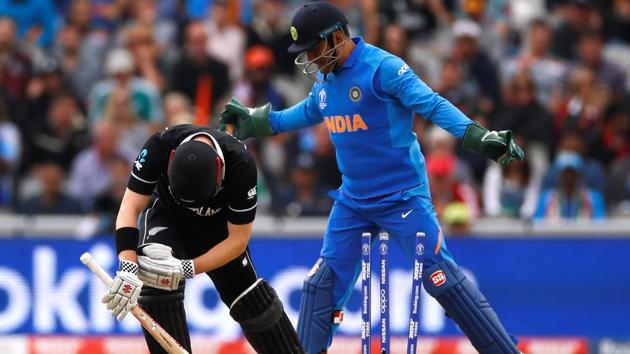India vs New Zealand, semi-final World Cup 2019: India-New Zealand semi-final pushed to reserve day after rain interruption
The World Cup semi-final between India and New Zealand will head into a second day after rain prevented the match finishing as scheduled at Old Trafford on Tuesday.
With less than four overs to go in what was a New Zealand batting innings that never really did get going, rain halted play first temporarily for three hours, and then permanently for the day. This, then, ensured that the umpires had no other option than to push the first semi-final of this World Cup into its reserve day on Wednesday, where the match will resume (hopefully, considering there is rain forecast for Wednesday as well) exactly where it left off; Bhuvneshwar Kumar bowling the 47th over to Ross Taylor.

Taylor’s unbeaten 85-ball 67 was a large reason why New Zealand found themselves on an overnight score of 211 for five in 46.1 overs, what with Taylor unable to push on at any stage even as his captain Kane Williamson was already anchoring the innings when their partnership began in the 19th over.
Rain, then, may just have been what the Kiwis needed to turn their fortunes on Tuesday. Had the officials slipped in a 20-over second innings—the minimum quota needed in an innings in the semis—in their effort to complete the match on the day itself, India would have needed 148 runs to win. That’s a required run rate of 7.4 runs an over, on a pitch which would’ve, in all likelihood, been spiced up under the covers against the dangerous Trent Boult and Lockie Ferguson; and all this after Jasprit Bumrah & Co had restricted them to run rate of 4.56 when play was called off.
READ: India vs New Zealand: Bowlers pack a punch in powerplay
But the same rain clouds that made Williamson’s side watch out for silver linings, snatched away their hopes in the eleventh hour, drizzling down over Old Trafford just when the umpires were inspecting the field to usher in a 20-over chase. That, as they say, was that. Given just how well the Indian bowlers were bowling all day long, New Zealand’s final target for India on Day 2 will be no more than 240 runs, which Virat Kohli’s side should be able to hunt down without too much trouble, weather permitting.
According to the forecast, there is more rain to follow on the reserve day as well, but the first big spell on Wednesday is expected at about the same time as it first began to wet the outfield on Tuesday—2pm Manchester time. But by then, if there are no other interruptions earlier, India should’ve already boarded their bus to London and the World Cup final.
Both India openers, Rohit Sharma and KL Rahul, are coming into this match on the back of hundreds (Sharma, of course, is coming in on the back of three successive tons and five over all in this tournament) and will do well not to start the innings like New Zealand’s openers did. After winning the toss and choosing to bat (a decision Kohli said he would’ve taken too), Williamson may have felt let down when Martin Guptill and Henry Nicholls took 17 balls to score the team’s first run.
Guptill was dismissed soon after, edging a short and fierce Bumrah delivery to Kohli at second slip, who took the catch with his fingers pointing up and even managed to injure one of those digits. But not even a possible injury was going to stop India’s halt. At 1 for 1, in walked Williamson, a man who has scored over 30 per cent of New Zealand’s runs in this World Cup. And once again, he was going to show how it was done.
READ: MS Dhoni scripts history with huge World Record
In the seventh over, Williamson cut Bhuvneshwar through point and ran a double. It took NZ’s score to double digits: 10 for one in 6.2 overs. He soon found his groove, and a beautiful straight drive down the ground off Bhuvneshwar for four even brought appreciation from Kohli. But Williamson was never going to take the game away from the Indians, so when a badly mistiming Nicholls was out in the 19th over, the few Kiwi fans in the stands would’ve sighed with relief and expected the incoming batsman to get going immediately.
Taylor never did, nurdling singles and even blocking deliveries that should have been dispatched for boundaries (although there were very few of the latter bowled by the Indians). So, very soon, New Zealand had two anchors batting in the middle. And the anchors did as anchors do, stalling the movement out of the vessel and knocking the wind out of its sails.






